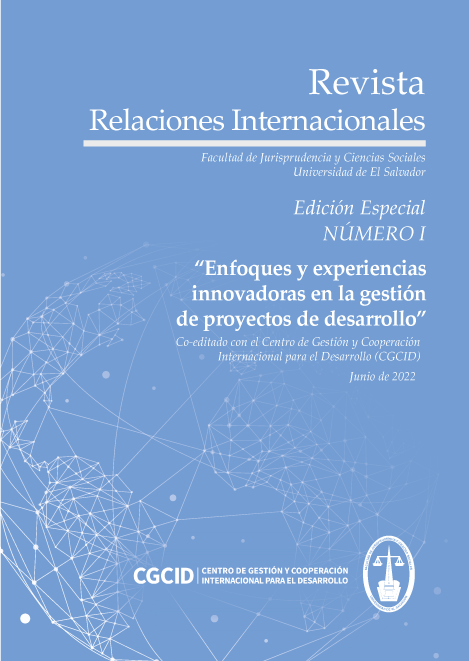The incidence and impact of social enterprises within El Salvador
Keywords:
Sustainability, Entrepreneurship, Assistance, Business modelAbstract
This article allows us to describe the growing impact that the so-called “fourth sector” has within Salvadoran society. Social entrepreneurship arises from the shortcomings of traditional sectors such as the private sector, whose main purpose is profit, leaving aside the resolution of social problems, and the non-profit sector, which despite contributing to the development of social, environmental and charitable objectives, often lacks a sense of sustainability in the medium and long term. Social enterprises seek to take the best of both sectors, on the one hand, they seek to achieve a beneficial impact on society as do civil society organizations and foundations, and on the other hand they take the business model and structure of many successful companies to ensure self-management without depending on third-party financing. In the present work, the incentives or impediments presented by national policies for the formation of new social entrepreneurship initiatives will be identified, for this purpose, the National Entrepreneurship Policy promulgated by the “Comisión Nacional de la Micro y Pequeña Empresa” in 2014. Due to the lack of bibliography on this topic at the national level, an exploratory study has been chosen to analyze the public, private / non[1]governmental spheres and directly the opinion of social entrepreneurs. This article is based on the premise that social entrepreneurship represents a viable and sustainable alternative to fight against handouts that often entails the execution of traditional social impact projects.
Downloads
References
Alfonso Rodríguez Ramírez, “Nuevas perspectivas para entender”, https://rcientificas.uninorte.edu.co/index.php/pensamiento/article/view/864/508
Angela Gómez, El emprendimiento social: Un camino hacia el desarrollo humano sostenible, Universidad de Cantabria, 2012. https://repositorio.unican.es/xmlui/bitstream/handle/10902/1389/%5B3%5D%20Mier%20G%C3%B3mez%2C%20MA.pdf?sequence=1&isAllowed=y
Antonia Sajardo Moreno y Rafael Chave, Balance y tendencias en la investigación sobre Tercer Sector no lucrativo. Especial referencia al caso español, Departamento de Economía Aplicada e Instituto Universitario IUDESCOOP Universitat de Valencia, 2006, https://www.redalyc.org/articulo.oa?id=17405605
Bases de la Copa Mundial de Emprendimiento, Conamype, http://ventanilla.minec.gob.sv/la-copa-mundial-de-emprendimiento-2021-el-salvador/
Bessie Arevalo, Vilma Cordova, Herbert Flores, Guillermo Paniagua, Economía solidaria como alternativa para promover el desarrollo económico local: una propuesta para el municipio de berlín, usulután. UCA 2013, https://www.uca.edu.sv/economia/wp-content/uploads/Econom%C3%ADa-solidaria-como-alternativa-para-promover-el-desarrollo-economico-local.pdf
Carlos Pinzón, Emprendimiento verde como generador de sostenibilidad en la pequeña empresa de Bogotá del subsector de cosméticos, Universidad de Manizales, https://ridum.umanizales.edu.co/xmlui/bitstream/handle/20.500.12746/3388/Pinz%C3%B3n_Mu%C3%B1oz_Carlos_Andr%C3%A9s_2018.pdf?sequence=1&isAllowed=y
Carolina Fernández, Beatriz de la Riva “Mentalidad emprendedora y cultura del emprendimiento”. Procedia - Social and Behavioral Sciences, https://n9.cl/xasco
CEPAL, Agenda 2030 para el Desarrollo Sostenible https://www.cepal.org/es/temas/agenda-2030-desarrollo-sostenible/objetivos-desarrollo-sostenible-ods
Cristian Huerta, El cuarto sector de la economía. Las empresas B en Chile, Universidad de Chile, 2018, https://repositorio.uchile.cl/bitstream/handle/2250/151833/El-cuarto-sector-de-la-economia-en-Chile-Es-necesaria-una-legislacion-para-las-Empresas-B.pdf?sequence=1&isAllowed=y
Edwin Teos, La micro y pequeña empresa genera el 31 % de empleos en El Salvador: CONAMYPE y BCR, La Prensa Gráfica, https://www.laprensagrafica.com/economia/La-micro-y-pequena-empresa-genera-el-31--deempleos-en-El-Salvador-CONAMYPE-y-BCR-20190215-0352.html
Informe del Banco Mundial: Los desechos a nivel mundial crecerán un 70 % para 2050, a menos que se adopten medidas urgentes, septiembre 20, 2018 https://www.bancomundial.org/es/news/press-release/2018/09/20/global-waste-to-grow-by-70-percent-by-2050-unless-urgent-action-is-taken-world-bank-report
José G. Vargas-Hernández, Análisis crítico de las teorías del desarrollo económico, Centro Universitario de Ciencias Económico Administrativas, Universidad de Guadalajara. https://www.unisc.br/site/sidr/2008/textos/63.pdf
Karen Molina, Primera empresa social en El Salvador invierte sus ganancias en guarderías, elsalvador.com, https://historico.elsalvador.com/historico/484383/la-primera-empresa-social-en-el-salvador-invierte-sus-ganancias-en-guarderias.html
Libro Verde: Fomentar un marco europeo para la responsabilidad social de las empresas. Comisión de las Comunidades Europeas, Bruselas, 18.7.2001, https://www.europarl.europa.eu/meetdocs/committees/deve/20020122/com(2001)366_es.pdf
María Gutama, Priscila Jiménez, “El emprendimiento y su evolución como una alternativa laboral en el contexto latinoamericano: una revisión de literatura”, Universidad de Cuenca, 2019, https://dspace.ucuenca.edu.ec/bitstream/123456789/31772/1/EL%20EMPRENDIMIENTO%20Y%20SU%20EVOLUCI%C3%93N%20COMO%20UNA%20ALTERNATIVA%20LABORA.pdf
Natalia Sánchez, La sostenibilidad en el sector empresarial, Universidad Politécnica de Catalunya, https://upcommons.upc.edu/bitstream/handle/2099.1/18820/TFM_NSanchez_La%20sostenibilidad%20en%20el%20sector%20empresarial.pdf
Palacios Núñez, Emprendimiento social: integrando a los excluidos en el ámbito rural, Universidad del Zulia, Maracaibo, Venezuela, 2010, https://www.redalyc.org/pdf/280/28016613002.pdf
Patricia López, Emprendimiento social: ¡soluciones con impacto, Impact HUB, 29 de enero 2019, https://sansalvador.impacthub.net/emprendimiento-social-soluciones-con-impacto/
Política Nacional de emprendimiento, Comisión Nacional de la Micro y Pequeña Empresa (CONAMYPE), https://www.conamype.gob.sv/wp-content/uploads/2014/08/Poli%CC%81tica-de-Emprendimiento.pdf
Taymer Miranda, A. Suset, Aida Cruz, Hilda Machado y Maybe Campos. El Desarrollo sostenible. Perspectivas y enfoques en una nueva época, Estación Experimental de Pastos y Forrajes “Indio Hatuey” 2007, Cuba, http://scielo.sld.cu/scielo.php?script=sci_arttext&pid=S0864-03942007000200001
Downloads
Published
Issue
Section
License
Copyright (c) 2022 Revista Relaciones Internacionales

This work is licensed under a Creative Commons Attribution-NonCommercial 4.0 International License.
The authors transfer the copyright rights in favor of the Faculty of Jurisprudence and Social Sciences of the University of El Salvador (through Aequus Editorial) to include their writing in Revista Relaciones Internacionales.








